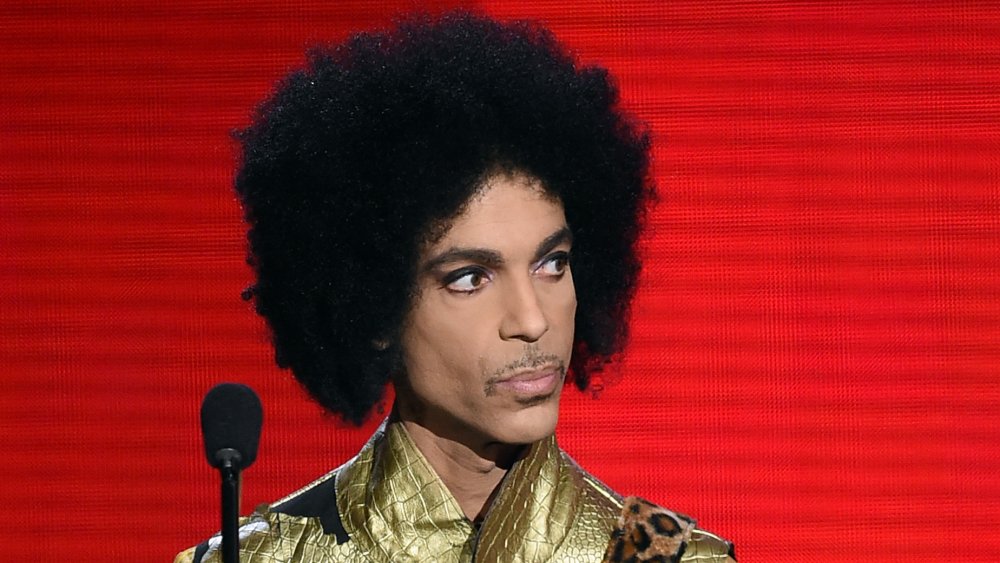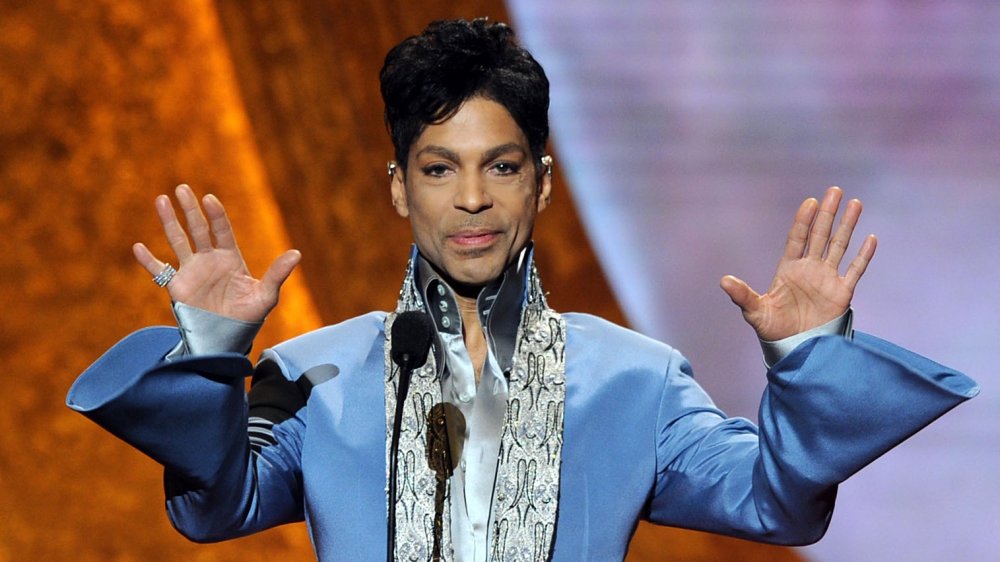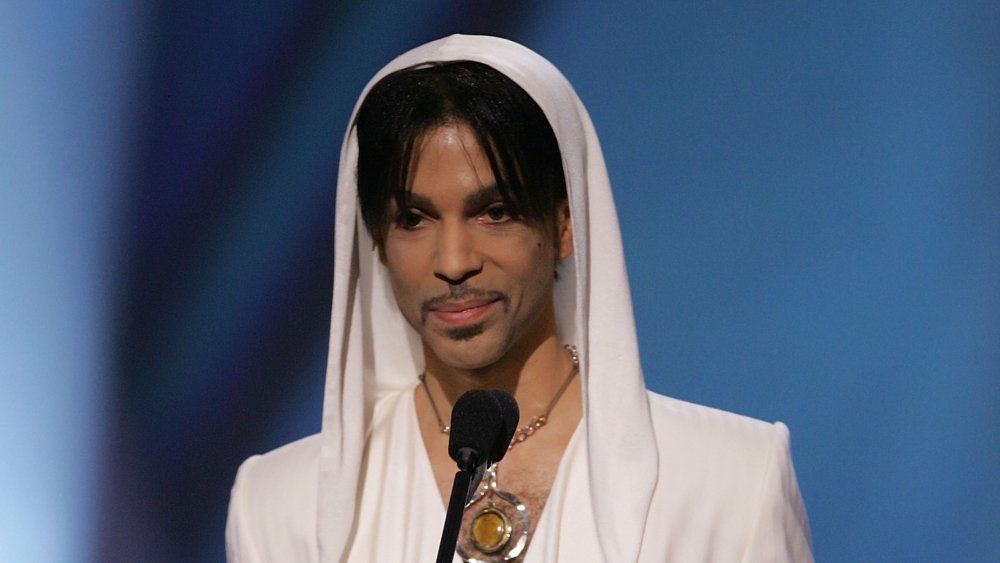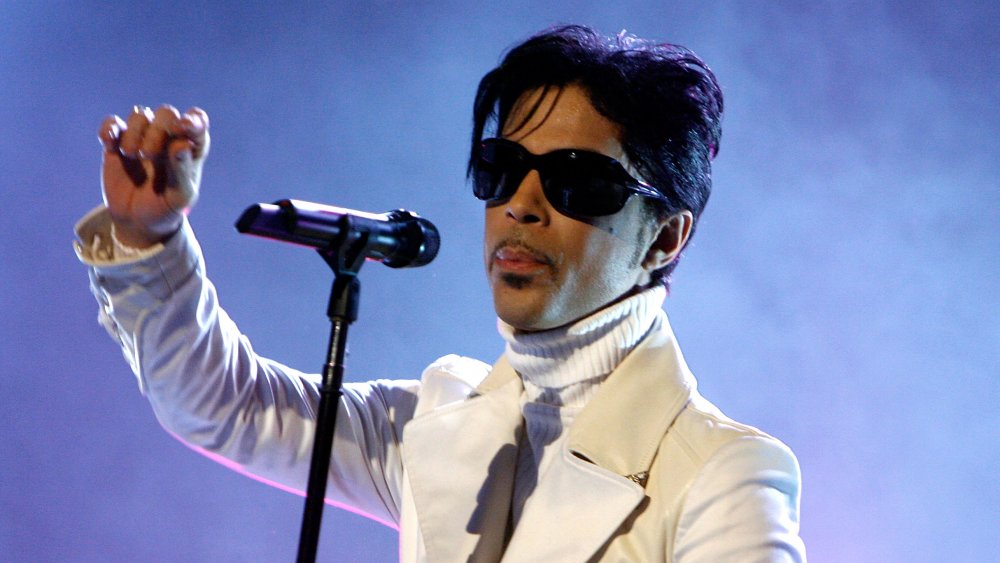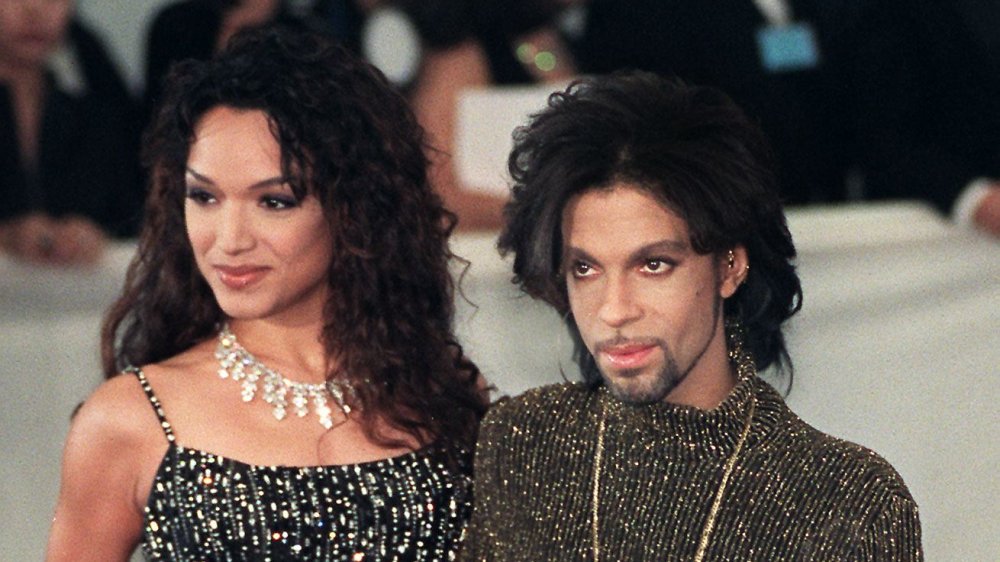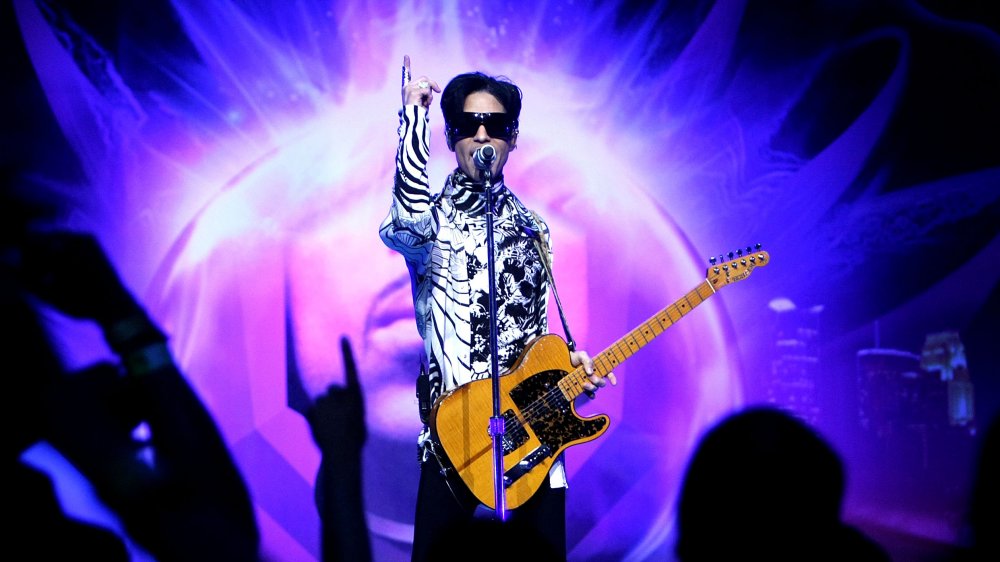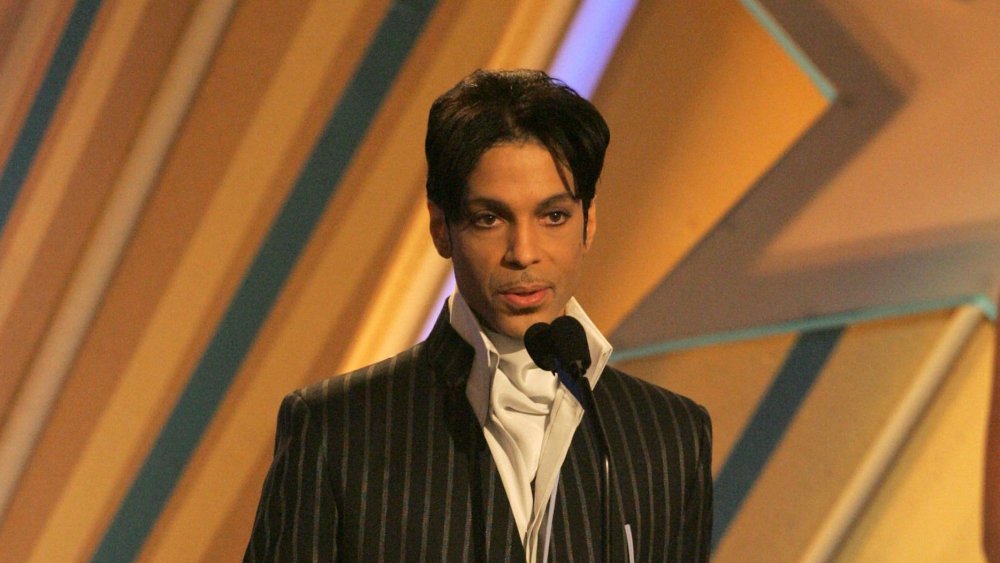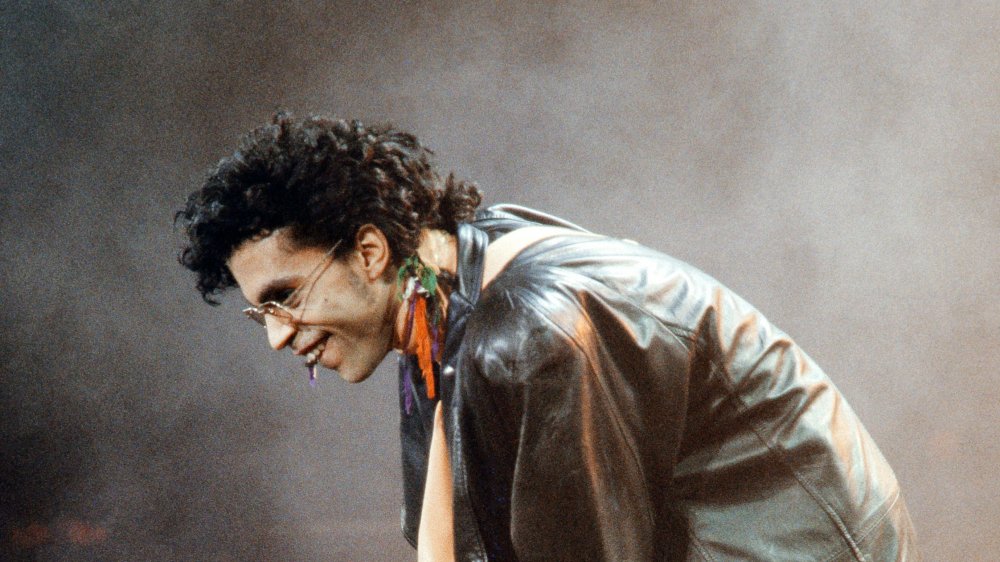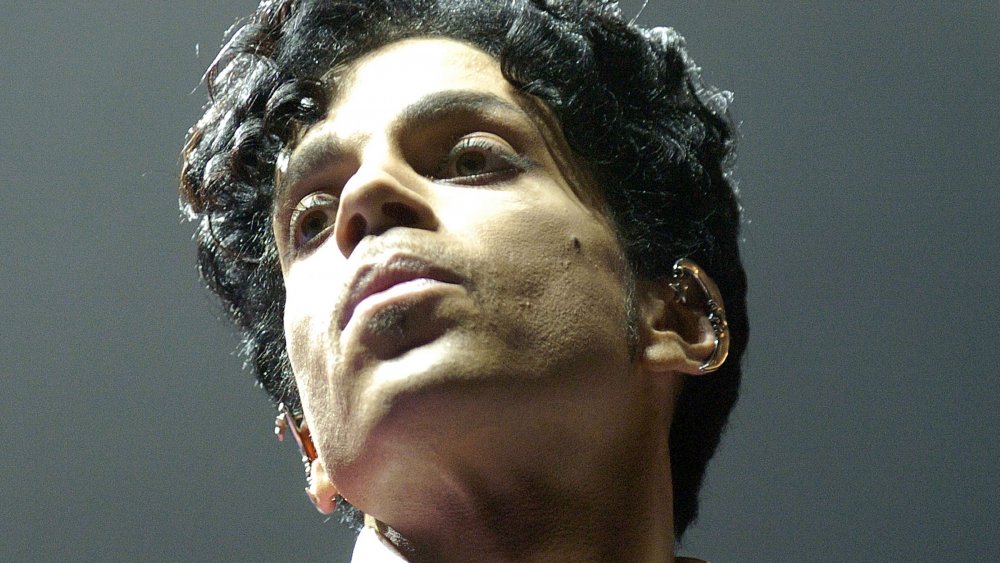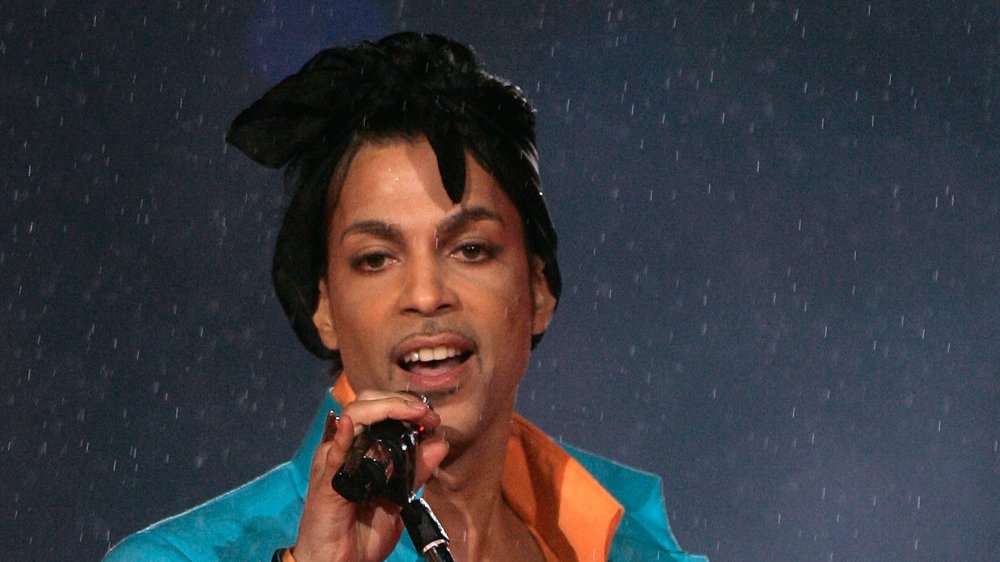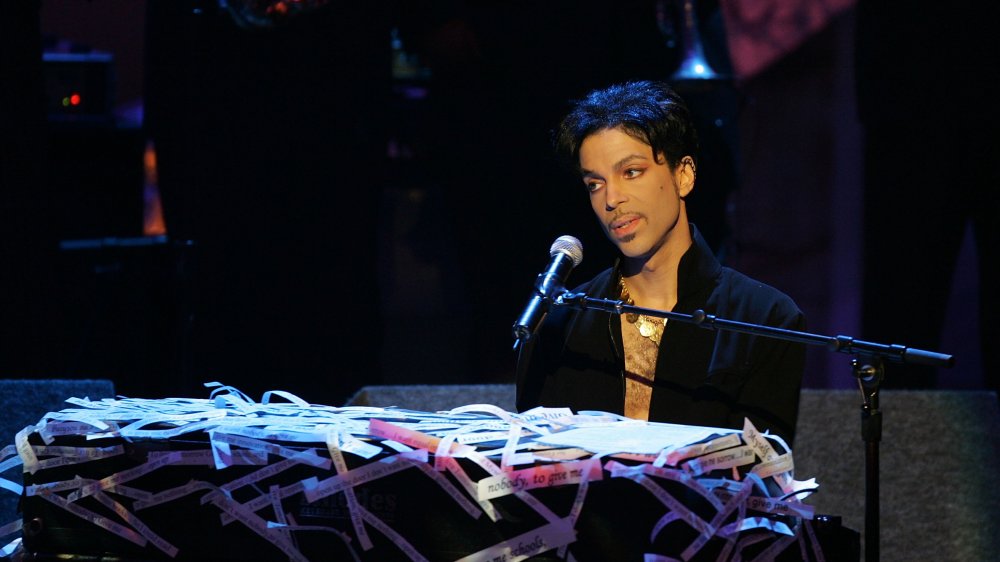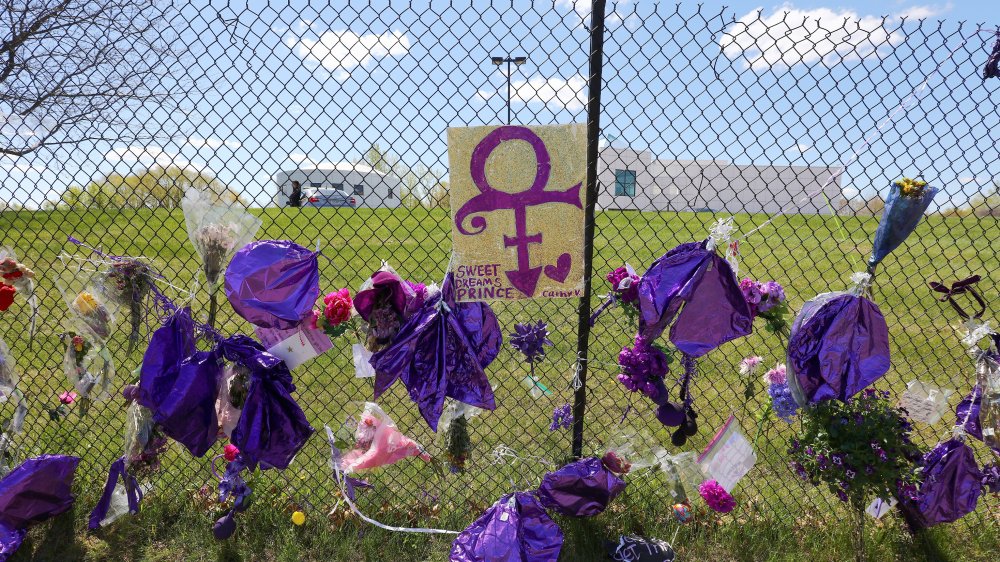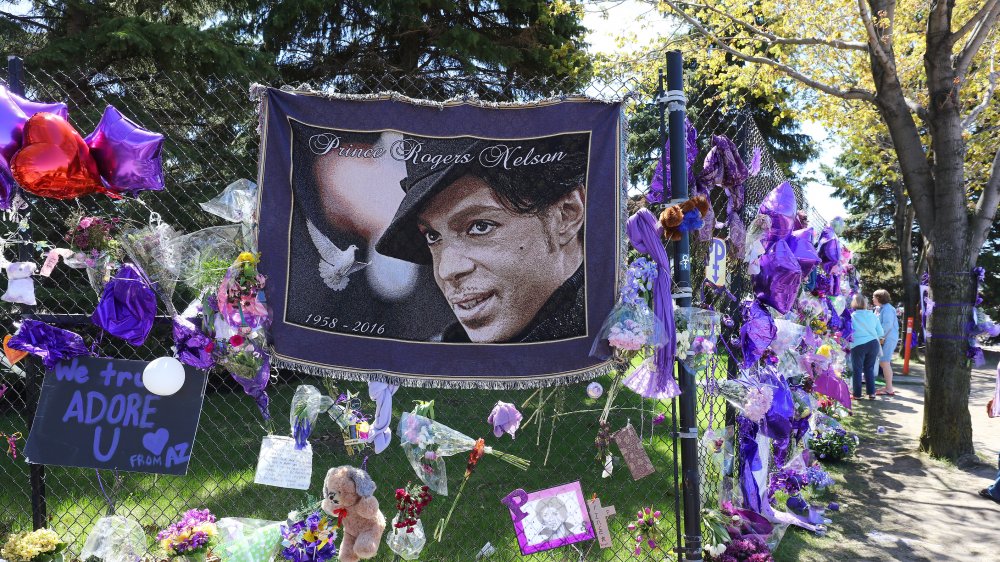The Tragic Real-Life Story Of Prince
Prince Rogers Nelson, if anyone, seemed like he had his life in order. The diminutive superstar was practically worshipped by millions, and with songs like "When Doves Cry," "Kiss," "Purple Rain," and "I Wanna Be Your Lover" under his belt, it's easy to imagine that the musician was set for a happy, productive life of singing the proverbial panties off each and every person who heard him.
Unfortunately, real life is rarely a fairy tale, and that applies even if you're a world-famous, esteemed musician. Prince generally kept the public at an arm's length from his private affairs, and though the world saw an eccentric musical genius, the Purple One's life was often marred with loss, tragedy, pain, and disaster. Today, we'll lift the veil of secrecy covering some of the more unfortunate incidents of the Artist's career and personal life. Let's take a look at the tragic real-life story of Prince.
Prince was born epileptic
It's easy to assume that if anything, Prince was in full control of his body. Anyone who has seen him prance and leap onstage can probably attest that the Artist's lithe frame and flamboyant clothing betrayed a very athletic dude who could back up every bit of rhythm in his music. As frequent collaborator David "DVS" Schwartz told Billboard in 2016, Prince was indeed a pretty good athlete and a downright incredible basketball player, whose speed, technique, and penchant for trash-talking made him a surprisingly dangerous opponent.
However, physical formidability was not always the case for Prince. In a 2009 interview with Tavis Smiley (via The Guardian), the musician revealed that he was a sickly, epileptic child. "I've never spoken about this before," he said, "but I was born epileptic and I used to have seizures when I was young." The Purple One then went on to say that his parents didn't really have an idea on how to deal with the situation, but everything worked out anyway. "One day I walked in to her and said, 'Mom, I'm not going to be sick anymore,' " Prince describes the end of his seizures. When his mother asked how he knew it, he simply said: "Because an angel told me so." What, did you think Prince's eccentric ways only started as a grown-up?
Prince and the bad hip
Prince was an extremely physical performer who was known to jump and prance around while wearing high-heeled platform shoes. Unfortunately, this wreaked havoc on his body over the years. As Sean Michaels of The Guardian reported in 2009, rumors of the Purple One's terrifying hip problems emerged in 2005, and since then, there have been several rumors of a secretive surgical procedure that he might or might not have undergone to deal with the situation. Another, perhaps even more prevalent allegation was that the musician was in dire need of a double hip replacement operation but couldn't have one because he was a Jehovah's Witness and refused blood transfusions as part of his faith. Instead, he relied heavily on painkillers to cope with the situation.
As columnist Alex Beam of the Boston Globe notes, Prince had actually been complaining about "shooting pains in his left hip" and "soreness in his ankles" way back in 2001. Others, according to The Guardian, say that his hip problems manifested even earlier and that he was already experiencing pain during his acrobatic performances during the Purple Rain tour in 1984-85.
While people such as Entertainment Tonight host Kevin Frazier have noted (per CBS News) that Prince did eventually resort to surgery, other outlets have treated his surgery situation as unclear. However, he continued to use painkillers until he died, so whatever procedures there may have been, it doesn't appear they managed to take away his pain.
Prince's troubles with censorship
Know those "parental advisory" labels that inform adults that the record in question has explicit lyrics or content (and also inadvertently tell the young consumers where all the cool stuff is)? As Ken Paulson of USA Today tells us, we have Prince to thank for that. Not that the artist personally lobbied for this particular form of pseudo-censorship, though. He merely inspired it.
In 1984, Prince's Purple Rain was wooing audiences all over, and Senator Al Gore and his wife, Mary "Tipper" Gore, were among the many people who bought it. However, the Gores were in for a surprise when the neat new pop album turned out to feature "Darling Nikki," a song that liberally references self-love and promiscuity. The terrors of Prince being Prince were enough to send Mrs. Gore on a warpath, and her Parents Music Resource Center group soon compiled the "Filthy Fifteen," a list of "objectionable" songs from artists such as Prince, Madonna, AC/DC, Black Sabbath and, uh, Sheena Easton. After much lobbying, public attention, and hand-wringing, and under a potential threat of government regulation thanks to Tipper Gore's connections, the music industry eventually adapted the warning label system that kids of the CD-buying era know and ... well, know.
Prince was a multiple divorcee
Prince being, you know, Prince, it's not exactly a surprise that he was rather popular with the ladies. Unfortunately, despite his considerable charisma, he never quite managed to make his marriages last. As Biography tells us, the musician was a notoriously private man when it came to his personal goings-on, but we do know that he had his share of long-term relationships and was married twice. Unfortunately, neither of his marriages were meant to last.
The first of Prince's future ex-wives was Mayte Garcia (pictured), a dancer and backup singer. The two married on Valentine's Day 1996, but their union proved to be a tragic one thanks to the death of their newborn son later that year. Per The Irish News, the couple eventually divorced in 2000. In 2001, the Artist married Manuela Testolini, who, as Rolling Stone writes, worked with Prince's philanthropic organization, Love 4 One Another. The two bonded over their shared love of charity, but it wasn't meant to last. In 2006 they, too, divorced. They seem to have parted on relatively friendly terms, though, and after the musician's death, Testolini revealed that Prince had been involved in years of often anonymous charitable work.
Prince's contractual disputes
Even if you're not particularly familiar with Prince's music, there's a decent chance that you've heard about his many, many contract-themed controversies with an assortment of record companies. As Eamonn Forde of The Guardian writes, things started out quite well, as Warner Music signed Prince in 1977, when he was only 18 years old, and allowed him to mature over multiple albums, until things exploded with the advent of MTV and his Top Ten hit, "1999." Prince later set up Paisley Park Records, which operated jointly with Warner ... until the early '90s, when things got real ugly.
From 1993 to 1996, disputes over money and musical output caused the Purple One to rebel against Warner, appearing in public with the word "slave" on his cheek and changing his name to the now-famous "The Artist Formerly Known As Prince" symbol (you know the one, though you might be hard-pressed to draw it from memory). Eventually, he had to churn out a series of sometimes subpar albums in order to get out of his Warner contract, but new record companies failed to bring him long-term satisfaction. After a string of one-off album deals with various labels, Prince found himself in hot water with Columbia, who prevented the release of his 2007 album, Planet Earth, in the UK market because the musician had agreed to give it for free with the Mail on Sunday newspaper ... without informing his record label.
Prince's late-life health troubles and opioid addiction
As Billboard tells us, toward the end of his life, Prince was hardly the free-wheeling force of nature he was in his Purple Rain days. While part of this may or may not have been due to the simple fact that he was no spring chicken anymore, a lot of the artist's inner circle grew increasingly concerned about him as realization dawned: Prince had developed an opioid addiction.
The musician's health situation started to unravel on April 7, 2016, when he saw the doctor of his bodyguard and friend, Kirk Johnson, and received an IV, as well as prescriptions for nausea medication and Vitamin D. A week later, on the night between April 14 and April 15, Prince suddenly passed out on a plane, which had to land in Illinois. As Biography describes, the public was told that the incident happened due to a severe flu, though it appears he had actually overdosed from the opioid Percocet.
The Purple One had managed to keep his pill-popping habits on the down low, according to Johnson. He says Prince had been "looking just a little frail," and there had been some mood swings and suchlike. However, he maintains that he had no idea that the musician had been dealing with an addiction until the plane incident.
The Black Album controversy
Who made the most terrifying "Black Album" in the history of popular culture? Some might be tempted to say Metallica, seeing as it's the popular nickname for their self-titled mega-success from 1991. However, as Den of Geek notes, the correct answer is actually Prince — at least, if you asked the man himself.
The year was 1987, and Prince was all set to release a new album, which may or may not have been called The Funk Bible but is usually known as The Black Album due to its completely dark cover. The funky record was heavily influenced by African music, and reportedly, 500,000 copies were ready and 100 promo albums had already gone out, when all of a sudden, the musician called it quits. His explanation was that he had been possessed by a demon called Spooky Electric during the recordings, and thus, the album was too evil to distribute. While some people indeed agree that Prince was possessed into making this decision, they suspect that it was by the drug MDMA, which the usually anti-drug artist briefly tried around this time.
Prince moved on to other things, but The Black Album still found its audience. As Vulture notes, it went on to become just about the most bootlegged album around.
Prince lost his son
No parent should ever lose their child. Unfortunately, this exact thing happened to Prince during his marriage to Mayte Garcia, whose memoir, The Most Beautiful: My Life with Prince, and a 2017 interview with ABC shed light on what must have been one of the absolute worst events of Prince's life. Garcia, who was Prince's backup dancer before they married, says that her favorite memory of her life with the superstar was the day she told him about her pregnancy. As Biography tells us, their infant son, Amiir, was born on October 16, 1996, but the joyful story soon took a dark turn, as the baby suffered from a rare and serious condition called Pfeiffer syndrome.
According to Garcia's memoir (via People), the pregnancy had some complications, but the couple opted against medical intervention to screen for genetic conditions. Unfortunately, poor Amiir ultimately proved too weak to live, despite several medical procedures to save his life, and died when he was only six days old.
Prince was a control freak behind the scenes
As you can probably guess by looking at any picture or video clip about him that has ever been produced, Prince was rather careful about his public image. According to The Guardian, this controlling streak extended to many other aspects of his life, which was often hard for the people working with him — or, rather, for him. As an example, publicist Alan Edwards is a man who has worked with Michael Jackson, David Bowie, and The Who. When Prince wished to work with him, he was flown to Minneapolis and put in a see-through cube suspended in air while the Artist's music played. Afterwards, he was questioned by a chauffeur. Apparently, someone had been watching, because a few days later, he was hired.
This, reportedly, was a fairly typical experience about the demanding, eccentric, yet quite distant taskmaster that Prince was said to be. While not exactly a cruel person, he was driven by the need to control his own career, and people who have worked for him describe him with adjectives like "relentless" and "intimidating." Edwards' business partner at the time, Chris Poole, says that Prince "ran through people" and that some of the folks who had worked with him "didn't work again."
The death of Prince
One of the most tragic things about Prince is, of course, the fact that he died well before his time. As NBC News and Biography tell us, on April 21, 2016, Prince Rogers Nelson was found dead in an elevator at his Paisley Park estate. He was only 57 years old. Predictably, the local officials immediately launched an investigation, while the beloved star himself was cremated and buried in a small ceremony just two days after his death.
It soon transpired that Prince had been quietly dealing with his pain by consuming copious amounts of painkillers, which had led to opioid addiction. In the end, he had unwittingly taken pills that seemed like Vicodin but were counterfeit stuff laced with a significant amount of fentanyl, an incredibly strong synthetic substance that is reportedly up to 50 times more potent than heroin. According to Carver County Attorney Mark Metz, Prince's overdose was in all likelihood completely accidental, and a search of the premises revealed all sorts of painkillers around the place. Many of them were not in "official" pharmacy containers, and since the musician didn't have any known painkiller prescriptions, there's no telling how he'd acquired it all. "Prince's death is a tragic example that opioid addiction and overdose deaths do not discriminate no matter the demographic," Metz laments.
The aftermath of Prince's death got really, really strange
After Prince's untimely death via accidental fentanyl overdose, things got pretty weird, as the BBC tells us. The case was investigated for two years, but authorities found no evidence of any intentional shenanigans whatsoever. However, this didn't stop the artist's surviving family from suing Dr. Michael Schulenberg for playing a "substantial part" in the situation and not recognizing and treating Prince's opioid addiction. In January 2020, USA Today reported that the case against Schulenberg and an assortment of other defendants had been dropped. The source of the pills that killed the superstar continues to be unknown.
Meanwhile, as USA Today argues, the man who once turned himself into a symbol has gone on to become a symbol on many unfortunate fronts, from unnecessary secrecy and the dark side of celebrity to the equally dark depths of America's opioid crisis. As private as Prince was, it's probably fair to say that he wouldn't particularly cherish this kind of attention.
The estate battles
What happens if you're rich, famous, and die before you get around to making a will? Unfortunately for Prince's estate, that's not a rhetorical question. According to USA Today, as of April 21, 2019, an army of lawyers had been law-wrangling for three whole years to figure out the value and sharing of the artist's fortunes and possessions, and a whole lot of ... well, everything continued to be unclear. What's more, there were all sorts of tax bills yet to be taken into account, and the heirs were clashing with the estate's administrators, as well as each other. Even the precise value of the estate, which was at one point somewhere between $200-$300 million, was unclear.
In February 2020, Billboard reported that the estate and Legacy Recordings were releasing a batch of reissues and live albums, and in May 2020, Variety reported a three-day YouTube streaming event of the famous Prince and the Revolution: Live concert filmed in 1985, so presumably, things are slowly proceeding.
